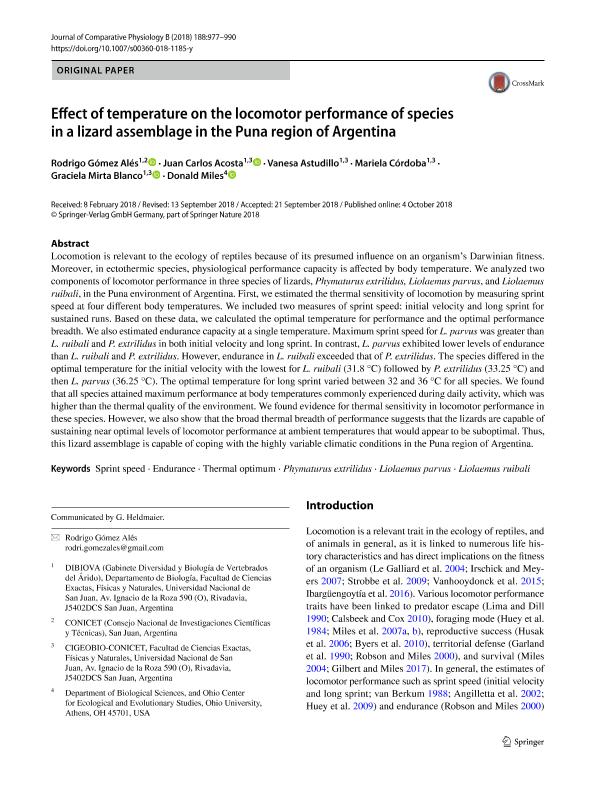Artículo
Effect of temperature on the locomotor performance of species in a lizard assemblage in the Puna region of Argentina
Gómez Alés, Carlos Rodrigo ; Acosta, Juan Carlos; Astudillo, Graciela Vanesa
; Acosta, Juan Carlos; Astudillo, Graciela Vanesa ; Córdoba, Mariela Analía
; Córdoba, Mariela Analía ; Blanco, Graciela Mirta; Miles, Donald Bailey
; Blanco, Graciela Mirta; Miles, Donald Bailey
 ; Acosta, Juan Carlos; Astudillo, Graciela Vanesa
; Acosta, Juan Carlos; Astudillo, Graciela Vanesa ; Córdoba, Mariela Analía
; Córdoba, Mariela Analía ; Blanco, Graciela Mirta; Miles, Donald Bailey
; Blanco, Graciela Mirta; Miles, Donald Bailey
Fecha de publicación:
11/2018
Editorial:
Springer Heidelberg
Revista:
Journal of Comparative Physiology B: Biochemical, Systems and Environmental Physiology
ISSN:
0174-1578
e-ISSN:
1432-136X
Idioma:
Inglés
Tipo de recurso:
Artículo publicado
Clasificación temática:
Resumen
Locomotion is relevant to the ecology of reptiles because of its presumed influence on an organism’s Darwinian fitness. Moreover, in ectothermic species, physiological performance capacity is affected by body temperature. We analyzed two components of locomotor performance in three species of lizards, Phymaturus extrilidus, Liolaemus parvus, and Liolaemus ruibali, in the Puna environment of Argentina. First, we estimated the thermal sensitivity of locomotion by measuring sprint speed at four different body temperatures. We included two measures of sprint speed: initial velocity and long sprint for sustained runs. Based on these data, we calculated the optimal temperature for performance and the optimal performance breadth. We also estimated endurance capacity at a single temperature. Maximum sprint speed for L. parvus was greater than L. ruibali and P. extrilidus in both initial velocity and long sprint. In contrast, L. parvus exhibited lower levels of endurance than L. ruibali and P. extrilidus. However, endurance in L. ruibali exceeded that of P. extrilidus. The species differed in the optimal temperature for the initial velocity with the lowest for L. ruibali (31.8 °C) followed by P. extrilidus (33.25 °C) and then L. parvus (36.25 °C). The optimal temperature for long sprint varied between 32 and 36 °C for all species. We found that all species attained maximum performance at body temperatures commonly experienced during daily activity, which was higher than the thermal quality of the environment. We found evidence for thermal sensitivity in locomotor performance in these species. However, we also show that the broad thermal breadth of performance suggests that the lizards are capable of sustaining near optimal levels of locomotor performance at ambient temperatures that would appear to be suboptimal. Thus, this lizard assemblage is capable of coping with the highly variable climatic conditions in the Puna region of Argentina.
Archivos asociados
Licencia
Identificadores
Colecciones
Articulos(CCT - SAN JUAN)
Articulos de CENTRO CIENTIFICO TECNOLOGICO CONICET - SAN JUAN
Articulos de CENTRO CIENTIFICO TECNOLOGICO CONICET - SAN JUAN
Articulos(CIGEOBIO)
Articulos de CENTRO DE INVESTIGACIONES DE LA GEOSFERA Y BIOSFERA
Articulos de CENTRO DE INVESTIGACIONES DE LA GEOSFERA Y BIOSFERA
Citación
Gómez Alés, Carlos Rodrigo; Acosta, Juan Carlos; Astudillo, Graciela Vanesa; Córdoba, Mariela Analía; Blanco, Graciela Mirta; et al.; Effect of temperature on the locomotor performance of species in a lizard assemblage in the Puna region of Argentina; Springer Heidelberg; Journal of Comparative Physiology B: Biochemical, Systems and Environmental Physiology; 188; 6; 11-2018; 977-990
Compartir
Altmétricas



